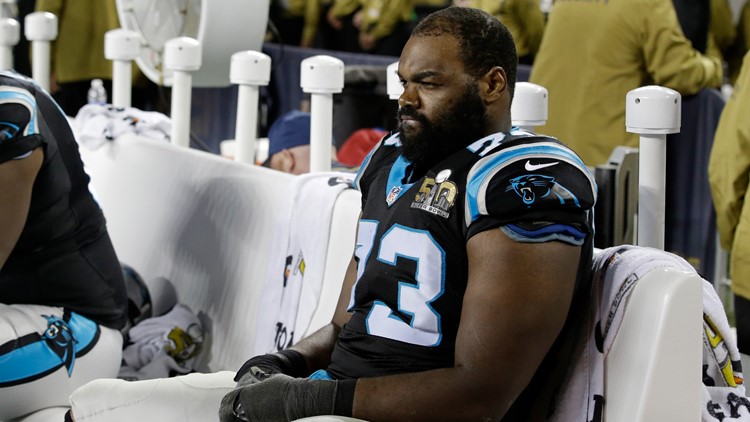Michael Oher, the former NFL tackle who inspired the movie “The Blind Side” starring Sandra Bullock, has filed a petition in a Tennessee court saying the couple he thought had adopted him were actually his conservators.
Oher is accusing Sean and Leigh Anne Tuohy of lying by having him sign papers making them his conservators rather than his adoptive parents nearly two decades ago. He is asking the court for the conservatorship to be terminated and for a full accounting of the money earned off the use of his name and story.
The former professional football player also claims that the Tuohys enriched themselves at his expense by “falsely and publicly” representing themselves as his adoptive parents.
A lawyer representing the Tuohys, who have called the allegations a shakedown attempt, told reporters on Wednesday, Aug. 16 that Sam and Leigh Anne intend to enter into a consent order to end the conservatorship.
Nearly two years ago, a judge ended pop star Britney Spears’ conservatorship, which initially sparked the #FreeBritney movement and increased awareness of the conservator process.
Part of what makes conservatorships tricky to understand is that the definition can change from state to state. Beyond high-profile celebrities like Spears, conservatorships often involve the elderly and people with significant medical conditions.
VERIFY answered five questions about conservatorships.
THE SOURCES
- Reynolds, Potter, Ragan and Vandivort, a Tennessee-based law firm
- Yates and Wheland, a Tennessee-based law firm
- Anderson Hunter Law Firm in Tennessee
- Crow Estate Planning and Probate, an estate planning law firm in Tennessee
- Rocket Lawyer, an online legal technology company
- Diane Robinson, principal court research associate at the National Center for State Courts (NCSC)
- Naomi Cahn, professor of law at the University of Virginia
- Government Accountability Office (GAO)
- Federal Housing Finance Agency: Conservatorship Rights Summary
- The American Bar Association (ABA)
- Los Angeles Superior Court and Ventura County Superior Court filings
- Superior Court of California, County of Santa Clara limited conservatorship explainer
- California State Courts: “Conservatorships Overview”
QUESTION #1
Is a conservatorship different from an adult adoption in Tennessee?
THE ANSWER
In Tennessee, where Oher and the Tuohys live, there are several key differences between a conservatorship and adult adoption.
A conservatorship, which is sometimes referred to as a guardianship, allows one person to make decisions on behalf of another who cannot do so for themselves.
The person who is subject to a conservatorship gives up certain rights, according to a Tennessee estate planning law firm. These can include the right to make decisions about medical examinations or treatment, and the ability to pay their own bills.
Unlike a conservatorship, a person does not give up their rights in an adult adoption. They are still able to “maintain their legal freedoms and decision-making abilities,” according to the Tennessee-based law firm Yates and Wheland.
Adoptions are also a permanent decision, while some conservatorships are temporary.
Tennessee is one of many U.S. states and territories that allows adults to be legally adopted, according to Anderson Hunter Law Firm.
Yates and Wheland describes adult adoptions as more of a “symbolic gesture to make a person an official part of the family,” though the adoptive parents do have certain rights if the adoptee dies or is injured.
QUESTION #2
Can someone placed under a conservatorship get out of the agreement?
THE ANSWER
If problems with the conservatorship arise or it is no longer needed, the agreement can be changed or ended through a court order, Rocket Lawyer explains.
This would require the person under the conservatorship, or someone on their behalf, to file a petition with the court and later appear at a hearing to present supporting evidence. That evidence can include medical reports, financial documents, photographs, videos and live testimony, according to Rocket Lawyer.
A judge ultimately makes the final call on whether the conservatorship should be changed or ended.
Even if a person under a conservatorship isn't able to handle their own affairs, the judge can still remove the conservator if they aren't fulfilling their duties and terminate the conservatorship altogether.
QUESTION #3
Is there only one type of conservatorship?
THE ANSWER
Not all conservatorships are the same, and not all are called conservatorships. There are two terms that are sometimes used interchangeably: conservatorship and guardianship, depending on what state you're in.
"Typically, when we talk about guardianships, we're talking about personal decisions, things like where to live, medical care, issues like that," Diane Robinson, a principal court research associate at the National Center for State Courts, said.
Naomi Cahn, a law professor at the University of Virginia, agrees with Robinson.
“There’s also conservatorship of the person which relates to things like medical decisions, and then there's conservatorship of the estate, which relates to financial decision making,” Cahn said. “But an individual can be subject to both or can be subject to just one or the other.”
Some reasons to petition for a conservatorship include older adults and the elderly who have memory problems like dementia or health issues that limit their everyday functions. Young adults can also be subjected to conservatorships, including in cases of mental illness or substance use disorder. People with intellectual disabilities may also be placed under conservatorships.
There are also temporary or limited conservatorships, which are mostly used on a case-by-case basis. Robinson said legal teams typically prefer limited guardianships or conservatorships to focus on areas where someone might be having difficulty and assess later.
QUESTION #4
Do some states have regulations to monitor conservatorships?
THE ANSWER
Some states have implemented more ways to monitor conservatorships, such as requiring periodic reporting to the court and creating online databases where people can track current cases.
All states require reports to the court that's overseeing the conservatorship, but some differ on how often – some are every year, some are every three, some every five.
In the last 10 years, states have “enacted nearly 400 guardianship bills ranging from a complete revamp of code provisions to minor changes in procedure,” according to the American Bar Association (ABA).
“Many statutory changes have advanced guardianship reform: safeguarding rights, addressing abuse, and promoting less restrictive options,” Elizabeth Moran, senior attorney for the ABA Commission on Law and Aging, wrote. “While guardianship laws have improved, implementation in practice continues to be inconsistent or lacking.”
One challenge is giving all courts the same amount of resources dedicated to sorting through the many conservatorship applications, and devoting the amount of time needed for such personal cases, Robinson said. Both Cahn and Robinson said a lack of mandatory reporting guidelines on a national level makes reform difficult but needed.
“There's no mandatory reporting in all of the states,” Cahn said. “There is no mandatory reporting to the federal government on the number of conservatorships that have been entered into, and so that is something that could be done through legislation - requiring states to do this and have a database with all of this, so we can see all this data together.”
QUESTION #5
Have high-profile celebrities apart from Britney Spears and Michael Oher been placed under conservatorships?
THE ANSWER
Amanda Bynes, an actress known for “The Amanda Show” and movies like “She’s All That” and “Easy A,” was placed under a conservatorship in 2014 after being diagnosed with bipolar and manic depressive disorder. Her mother Lynne Bynes was her legal guardian until the conservatorship ended in March 2022.
Disc Jockey Casey Kasem, who suffered from Parkinson's disease, was also placed under a conservatorship. A judge reversed the original conservatorship, which granted his wife Jean as a guardian, in May 2014 to his daughter Kerri Kesem after years of his children seeking charges for elder abuse from Jean. Casey passed away on June 15, 2014.
Other celebrities include The Eagles’ Randy Meisner, who was placed under a temporary conservatorship that he requested himself following the death of his wife in 2016, and actor Mickey Rooney in 2011.
The Associated Press contributed to this report.













